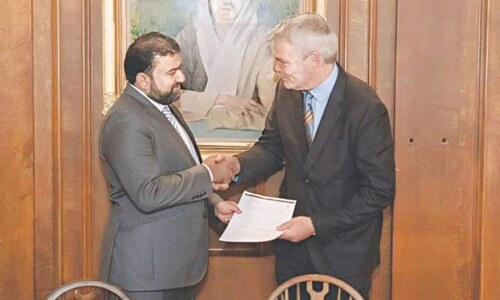ONE of the most formidable challenges that will confront the new government, to be voted into power in Delhi by the middle of next month, will be the economy.
Recently released figures indicate the grim economic situation, caused — as alleged by the BJP-led opposition — by a weak and corrupt government, or because of global factors — from the Congress’ perspective.
The Index of Industrial Production, an important indicator of growth, declined by 1.9pc in February, with key components, including manufacturing (which accounts for the bulk of the IIP) falling by a sharp 3.7pc. The manufacturing sector has been declining continuously over the previous five months.
Production of capital goods tumbled by 17.4pc, reflecting the lack of new investments in manufacturing. The index reflecting the production of consumer durables saw a 9.3pc fall.
The figures released by the ministry of statistics and programme implementation reveal that the February performance was the worst in nine months, and will contribute to terrible numbers for fiscal 2013-14 as a whole.
For the April 2013-February 2014 period, consumer durables production plunged by 12.2pc, while capital goods shrunk by 2.5pc. The key factor behind slackening demand for both is the high cost of funding, which is deterring consumers and industrial houses from making purchases.
Unfortunately, slackening domestic demand has coincided with a fall in India’s exports. Figures revealed that exports declined by 3.2pc in dollar terms in March, despite the weakening rupee; exports fell for the second month in a row, dampening the overall exports figure for the year.
According to the commerce ministry, India’s exports were up 4pc in the fiscal, but much below the expected growth rate. While the government had set an export target of $325bn for the fiscal, sluggish demand from the US and Europe saw exports touch only $312bn.
According to the World Trade Organisation (WTO), India’s share in world exports remained at 1.7pc, as it was in the previous fiscal. The WTO ranked the country at 13th place among the world’s top exporters.
Meanwhile, imports fell by 8pc during fiscal 2013-14, with non-oil imports declining sharply by 13pc to $283bn. Gold and silver imports fell by a massive 40pc to $33.5bn, thanks to the additional duties imposed to curb the import of the yellow metal.
Import duty on gold was raised to 10pc to prevent speculative buying of the metal. These curbs, however, led to a spurt in smuggling of gold, both by passengers flying into the country and by vessels that bring the metal, leading to a partial revival of the old smuggling trade.
Despite the fall in imports, India’s trade deficit touched a five-month high of $10.5bn in March, though the overall figure for the fiscal fell to $138bn, against $190bn at the end of the previous fiscal. With the trade deficit rising in March, the government is unlikely to ease the curbs on gold imports.
ECONOMIC planners in the UPA government, who have been battling inflation over the past few years, must have been disappointed, as inflation figures released last week by the central statistics office revealed the futility of their efforts. Retail inflation for March went up to 8.31pc from 8.03pc in the previous month.
Worryingly for a government facing an uphill struggle in the ongoing elections, food inflation stubbornly refused to fall, and went up to 9.1pc from 8.57pc in February. Vegetable prices were up by a stiff 16.8pc, and fruits by 17.19pc. Milk and milk products were also up by 11.02pc in March.
While the BJP has been hammering away at the UPA for its failure to control inflation and accusing it of mismanaging the economy, the government was satisfied that it had managed to rein in prices for the past three months. However, the March figures revealing a rise in food prices have caused concerns.
The Reserve Bank of India (RBI) is also in no mood to ease on the interest rate front. While it raised the repo rate three times over the past 10 months, the central bank left the rate unchanged at 8pc in April.
The RBI has set a target of 8pc for retail inflation by January 2015, and of 6pc for a year later. However, with fears of an El Nino effect this year that could result in deficient rains in India, analysts expect the tight conditions to continue in the current fiscal and possibly in the next as well.
Bank of America Merrill Lynch, in a report to its clients, urged them to focus on the monsoon forecasts by the Indian Meteorological Department, due out later this month.
“We remain concerned that [the El Nino impact] could hurt FY15 growth by 50-75 basis points, especially if the RBI delays rate cuts due to rising stagflation/inflation,” said the report. “We expect RBI Governor Raghuram Rajan to hold rates on June 1.” The bank expects retail inflation to persist at 8-10pc.
The IMF has also warned that consumer price inflation is expected to remain “an important challenge”. However, it is hopeful that inflation will “move onto a downward trajectory”.
The IMF believes India’s growth will recover from 4.4pc in fiscal 2013 to 5.4pc in the current financial year, “supported by slightly stronger global growth, improving export competitiveness and implementation of recently approved investment projects”. The Fund is optimistic that GDP might expand by 6.4pc in the next fiscal.
“Real GDP growth is projected to strengthen to 5.4pc in 2014 and 6.4pc in 2015, assuming that government efforts to revive investment growth succeed and export growth strengthens after the recent rupee depreciation,” the IMF report said.
“Continued fiscal consolidation will be essential to lower macroeconomic imbalances,” added the report, noting that structural reforms have to be deepened to support investment.








































Dear visitor, the comments section is undergoing an overhaul and will return soon.